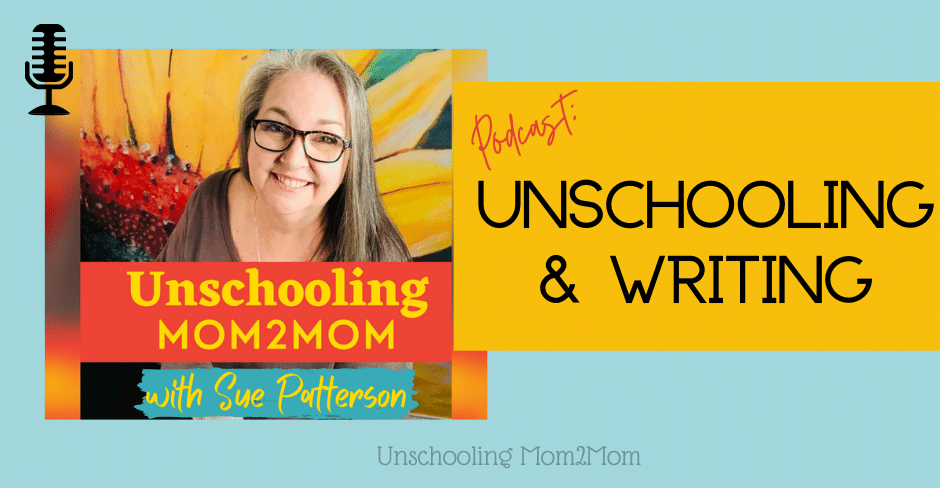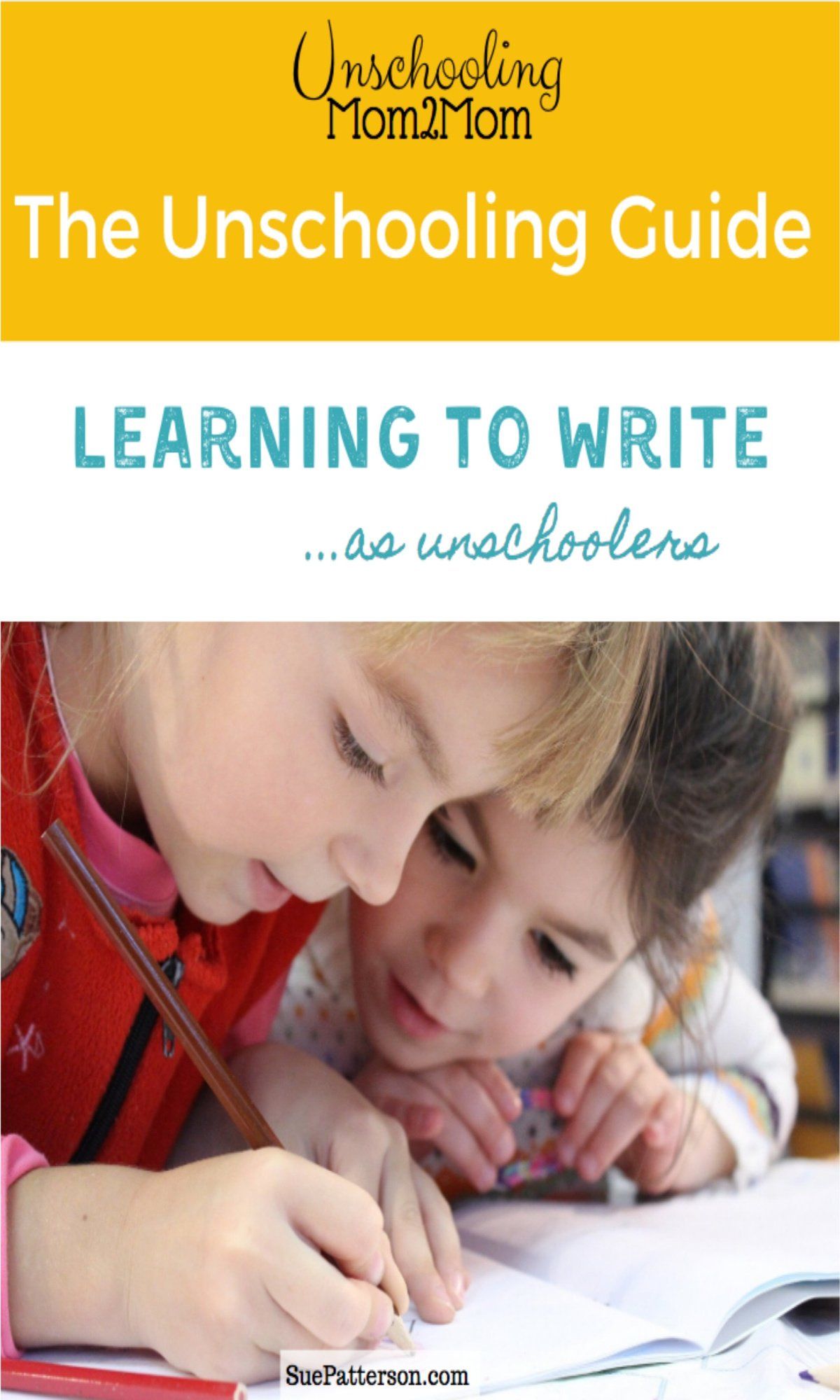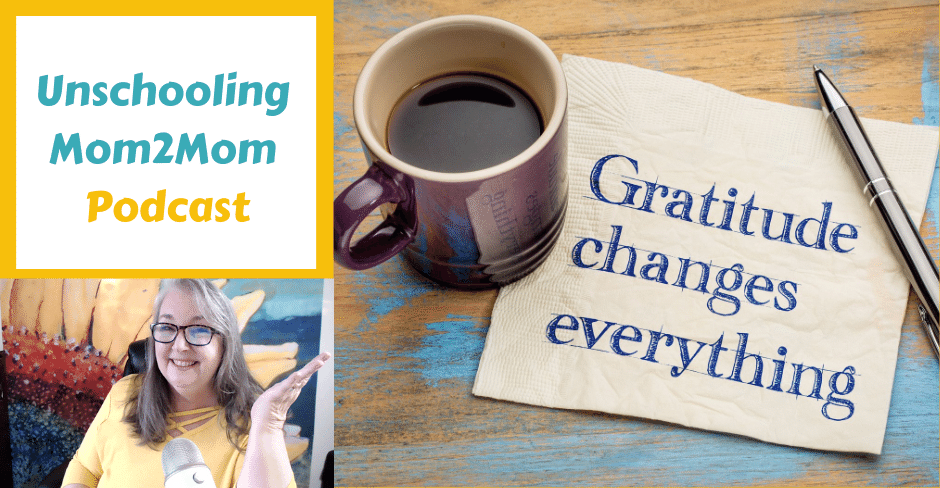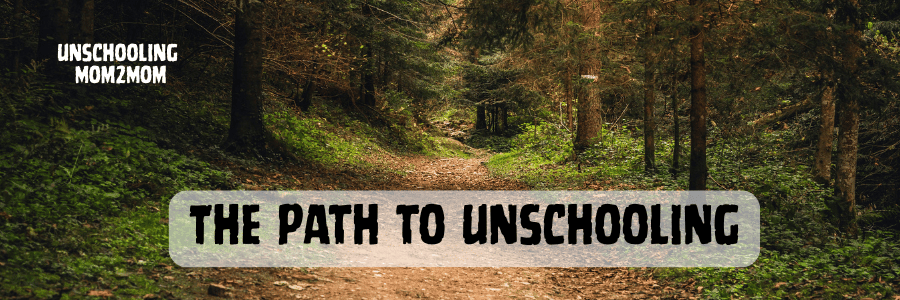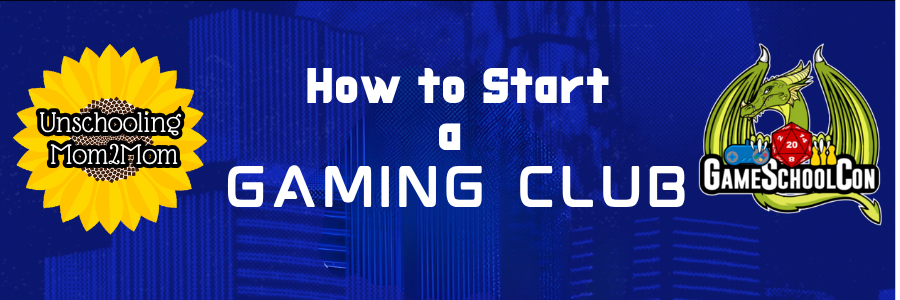Unschooling and Writing – Yes, Unschoolers Learn to Write!
Here's the Transcript for this Unschooling Mom2Mom Podcast about unschoolers and writing:
When we think of learning the basics, we think Reading-Writing-Arithmetic, right? So this week, let’s talk about how unschoolers learn to write without a curriculum and without lesson plans.
Two things need to be separated though - and they’re all mushed together when we use writing programs:
- Handwriting
- Creative Writing
If you’re looking for practical suggestions for creating a home that’s conducive for writers, you’ll want to grab the Unschooling Guide: Learning to Write. It has over 30 pages of ideas and inspiration. Lots of details.
But we’ll talk a little bit about that here.
I’m Sue Patterson and this is the Unschooling Mom2Mom podcast. I have three grown unschoolers - 32, 30, and 27 - all off on their adult adventures. And all really happy about their unschooled childhoods. Doors didn’t close for them, because we chose this unconventional path. In fact, more opened.
But now that they’re grown, I want to take all this information I’ve accumulated in the last 25 years, and share it with you. I’ve even created a coaching practice to help families see that they have options - because you do! SOO many options! I’ll put links in the show notes if you want more information about how to gain the information and support you need to be successful!
Each week, we hop on here to help you break free from the thoughts that there’s only one right way to Learn. And writing is no exception!
One of the problems we can all recognize is that school has a one-size-fits-all approach to learning. Even though we can plainly see that children develop at different paces - emotionally, physically and academically - we still cling to those familiar ideas of kids learning to write by a certain age!
Many kids in school learn to dislike writing - or any other subject, really - if they're exposed and expected to master it before they're ready. And that often happens with writing.
How DO Unschoolers Learn to Write?
This 30- page guide will help you explore the possibilities and see writing in a completely different way from how you learned in school!
Some of what's in this Unschooling Guide:
- Creating a writing-friendly home
- Ideas for supporting a home full of writers
- Learning styles and writing
- Searching for stories in the community
- Your own relationship to writing
- Ways YOU can explore and model writing more
- Deschooling and writing
- Reasons our kids may want to write
- What if they don't?
- My son's path from non-writer to a degree in Journalism
- Practical suggestions for writing
- Ideas about publishing kids' writing
- Extra Resources and Research links
- Fun and inspiring memes about writing
Unschooled kids have a huge advantage
Delaying formal academic instruction - something recommended by educational research - is easily done in our homes. We can wait until our children show signs of being ready. It's up to parents to resist the urge to compare their child to anyone else's. Everyone is on a different timetable. When we pressure them too soon, a variety of negatives are set in motion:
- the child is unsuccessful
- the child feels pressure to perform to keep you happy - instead of having an internal motivation to learn to write
- the child internalizes that something is wrong with them when they're just not ready
- And something many of us can relate to: the child internalizes the idea that "I'm not good at writing." or worse, "I hate writing."
Routine practice/drill type writing rarely takes the interest of the child into consideration. This means that the engagement level drops significantly. Formulaic instruction often crowds out the more authentic meaningful writer-driven pieces.
Writing has a lot of stages before it gets the pen to paper - or keyboard to monitor! Playing with letters, writing tools, and stories get children comfortable with the idea of writing. Just as you read to your child way before you thought they could read, the same holds true with writing. And just like potty-training, there's no rushing it, no matter how badly you or your child wish it would happen. It's important to notice these pre-writing activities and give them the space they deserve to develop - without rushing the kids through toward writing. Enjoy the time together, confident that they're developing what they need!
Make your home more conducive to emerging writers
Modeling writing. Do you write in front of them? Keep baskets of colorful pens and pencils available with scratch paper handy. If you have pages you’ve printed that you were going to throw away, you can can be cut up into smaller sizes, flip them over, and staple them together to make little notepads. Even using these for quick games of Tic-Tac-Toe or Hangman, gets kids used to using the writing tools.
Developing fine motor skills. Developing these physical skills will help with the frustration that can come with being expected to form letters correctly, but their little hand bones and muscles aren’t there yet.
Other ways to develop this physical component are playing with play-doh, using tweezers, practicing that pincer grip picking up little things like cotton balls or sugar cubes! Obviously, coloring together and learning to stay within the lines (if they want to) helps them develop some eye-hand control.
Creative Writing
Then when we move over to the Creative Writing aspect, remember that when we’re learning how to write stories, the content is what’s important. The excitement of telling our story matters more than the perfectly formed letter D. Let’s not merge the two skills together. It’s easy to see how this can backfire when you do - the stories lose their pizazz! It’s all about keeping it short and written correctly. And the “Creative” part of “Creative Writing” is lost.
So when we separate these two, the handwriting from the story writing, how do we help them with Creative Writing?
Story development is everywhere! If you’re still thinking it has to be the way it was presented to you in school, you may need a little more deschooling. But they’re developing stories when they’re playing with their dolls, or doing their super-hero moves across the living room, or visualizing what would happen if they climbed that tree out their window. This is the start of story development. It happens in their imagination, because that’s how humans play with their world.
So your role, as the unschooling parent, to help them, is to be a great sounding board. It may first start as simple conversations,
“Tell me more”
“Was he fast?”
“Where did he go?”
Story Dictation is fun! We did this with my kids. They told me their story and I typed it onto a word document. You can use a font that is kid-friendly (look for one that makes the “a” shape, a little more handwriting-familiar.) I’ve started this with Jackson, my 6-year old grandson! He tells me the story from his imagination, and I type what he tells me. Sometimes, I ask questions,
“What was he wearing?”
“Was it sunny out or cloudy?”
Be careful to not overstep though. Watch how they respond to your “helpfulness.” If it’s interrupting the “flow” or comes across in a way that implies their story isn’t good enough without your help, you’ll want to just be the typist. Let it go! Then keep it in a little online folder full of all their stories. They can print it out and show it to their other parent or grandparents or maybe even keep it in their own little folder of stories.
Separate Handwriting from Creative Writing
The main thing to remember is that handwriting and creative writing are two completely different things. We may have to do a little internal digging around, if we find we have some strong feelings about either of these topics. That’s ok, we have a lot of resources to help you.
Remember that your child’s path to writing is different from your own. Lots of circumstances are different, so don’t assume they’ll have the same experience with writing that you do - good or bad!
That’s it from me this week, on our topic of writing. I, of course, have a lot of additional thoughts about this, as a writer myself and as a mom of a kid who did no writing as a child or teen but ended up with a degree in Journalism! I’ll have to share that with you another time. Boys and Writing
In the meantime, enjoy your children. Learn what you can about how unschooling works - because it does! And I’ll talk with you next week!
But now that they’re grown, I want to take all this information I’ve accumulated in the last 25 years, and share it with you. I’ve even created a coaching practice to help families see that they have options - because you do! SOO many options!


